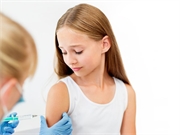- Could Your Grocery Store Meat Be Causing Recurring UTIs?
- Are You Making This Expensive Thermostat Error This Winter?
- Recognizing the Signs of Hypothyroidism
- 10 Strategies to Overcome Insomnia
- Could Artificial Sweeteners Be Aging the Brain Faster?
- Techniques for Soothing Your Nervous System
- Does the Water in Your House Smell Funny? Here’s Why
- Can a Daily Dose of Apple Cider Vinegar Actually Aid Weight Loss?
- 6 Health Beverages That Can Actually Spike Your Blood Sugar
- Treatment Options for Social Anxiety Disorder
One Dose of HPV Vaccine May Protect Against Cervical Cancer

MONDAY, Feb. 10, 2020A single dose of the human papillomavirus (HPV) vaccine works as well as multiple doses to protect older teen girls against preinvasive cervical disease, which can develop into cervical cancer, researchers say.
For the study, the researchers analyzed data on more than 133,000 females aged 9 to 26. Half weren’t vaccinated and half received one or more HPV vaccine doses between January 2006 and June 2015.
Among 15- to 19-year-olds, those who were vaccinated had lower rates of preinvasive cervical disease than those who weren’t, the findings showed.
Within five years, about 2.6% of those who weren’t vaccinated developed preinvasive cervical disease, compared with less than 2% who had received one shot or more, according to the report.
The risk of preinvasive cervical disease was 36% lower for those who had one shot, 28% lower after two shots and 34% lower for those who had three doses, compared with those who weren’t vaccinated.
For the youngest (9 to 14 years) and oldest (20 to 26 years) age groups, there were no significant differences in risk for preinvasive cervical disease, according to the study published online Feb. 10 in the journal Cancer.
“This study shows the impact of vaccinating at younger ages and its lasting long-term protection against cervical cancer,” said study author Dr. Ana Rodriguez. She’s an associate professor of obstetrics and gynecology at the University of Texas Medical Branch at Galveston.
“It is important to educate parents about the need to vaccinate their children,” she added in a journal news release.
An accompanying editorial discussed the public health implications of the study.
“If one dose of HPV vaccine was sufficient for effective protection, HPV vaccine implementation and scale-up would require less logistics …, available doses could extend further, and the overall cost would be lower,” the editorial said.
HPV is the most common sexually transmitted infection in the United States, and certain types of the virus can cause cervical cancer.
The U.S. Centers for Disease Control and Prevention recommends girls and boys receive the vaccine at age 11 or 12. (It is also recommended for everyone through age 26.) Those under 15 should get two doses, the CDC advises.
More information
The American Academy of Pediatrics has more on HPV vaccination.
Source: HealthDay
Copyright © 2026 HealthDay. All rights reserved.










